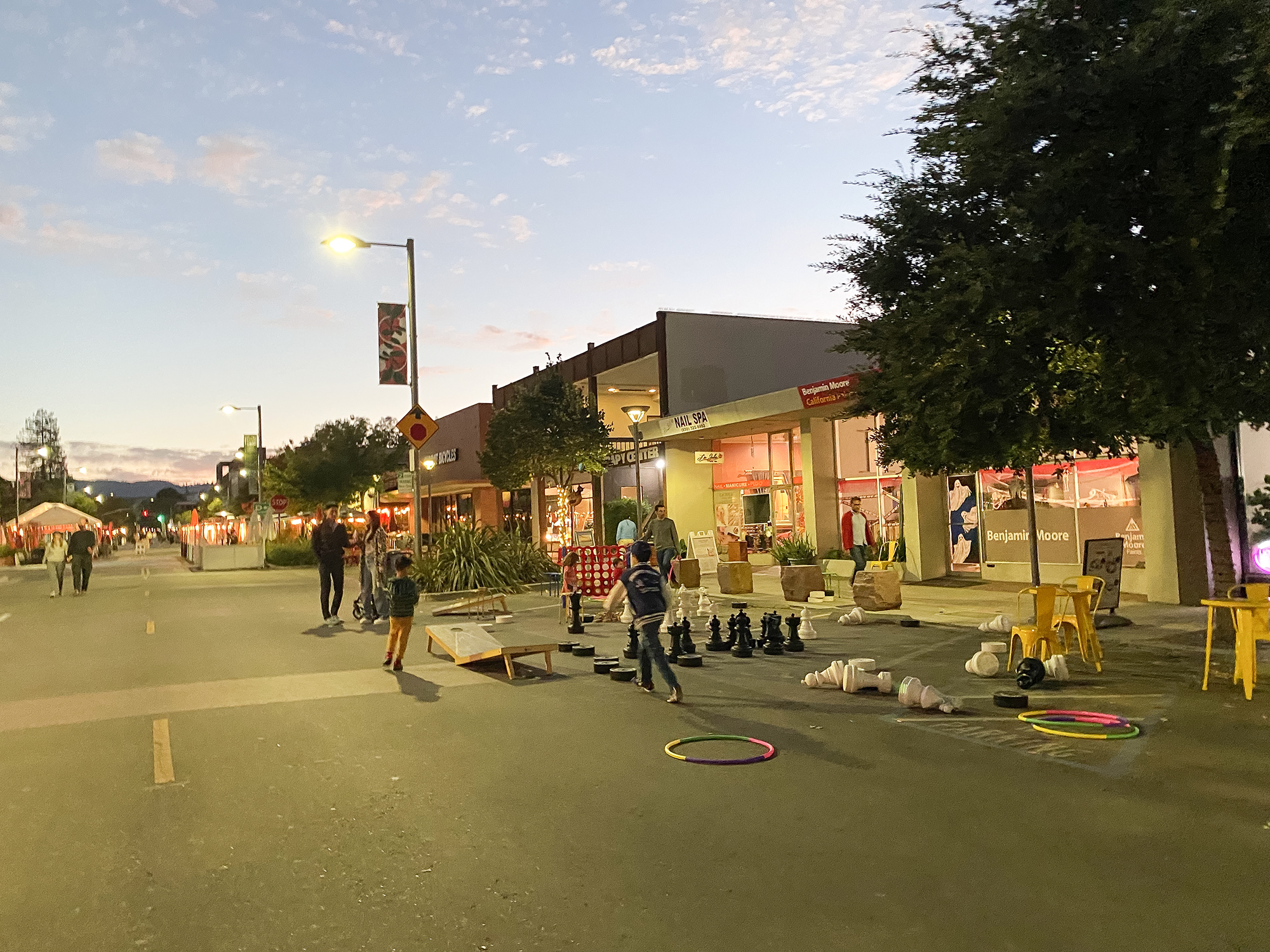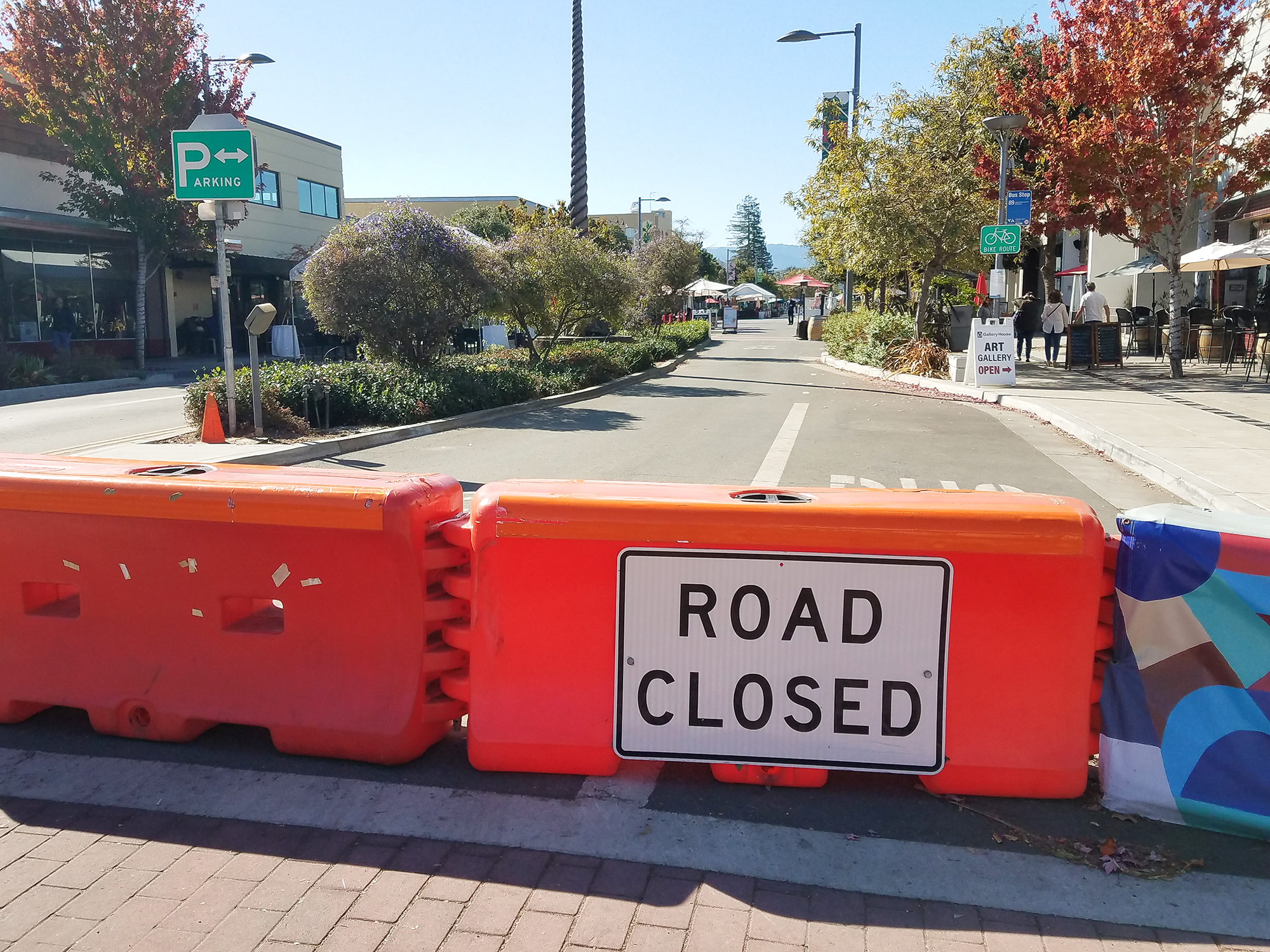Cars will not be returning to California Avenue any time in the foreseeable future.
After a heated debate that had polarized the business community of Palo Alto's "second downtown," the City Council decided on Monday night to retain California Avenue as a car-free zone on a permanent basis. By a 5-2 vote, with Mayor Lydia Kou and council member Vicky Veenker dissenting, the council also agreed to enhance the eclectic strip by creating bike lanes down the middle of the street, installing gateway signs and wayfinding signs and implementing a permanent parklet program for California Avenue.
In endorsing California Avenue as a permanently car-free zone, the council effectively turned what began as a pandemic-era emergency measure into the new normal. In doing so, the council rebuffed both a staff recommendation to conduct a year-long analysis of possible options and a concerted effort by dozens of area businesses to bring cars back. A proposal by some of these businesses for what they called a compromise — one traffic lane — sputtered Monday in the face of popular support among residents and most council members for keeping the street as a pedestrian promenade.
Both sides of the debate came out in force, with the council getting more than 150 pages of letters in the days leading up to the Nov. 6 hearing and hearing from dozens of residents and business owners at the meeting. Lisa Robins, owner of Vin Vino Wine, was among those who supported bringing back cars, which she argued improved access to businesses like hers. Michael Ekwall, co-owner of the California Avenue restaurant La Bodeguita del Medio, said that many businesses in the retail and service sectors are asking for the city to "give them back the visibility and access that they were willing to sacrifice for restaurants to survive during the pandemic."
"The majority of businesses are asking to reopen the street either fully or with a compromise that does make sense," Ekwall said.
But the vast majority of the speakers at the Nov. 6 hearing strongly supported keeping cars away from California Avenue. Bruce McLeod, a resident who frequents California Avenue, said he likes to go to areas where he can walk without worrying about a car running over him and dine "without a car backfiring next to my parklet."
Scott O'Neil also spoke out against any alternative that brings cars back, including the newly pitched one-lane compromise.
"Split the difference between safe and dangerous, you get dangerous; between clean air and dirty, you get dirty; between peaceful and noisy, it's noisy," O'Neil said. "Just as when you split the baby, you kill it, when you add a lane of traffic to a pedestrian boulevard, you kill it."
The solution proposed by city staff — commissioning a 12-month alternatives analysis — had its detractors on both sides of the debate. Neither proponents nor opponents were enthusiastic about waiting another year for a decision on a program that was known as "Summer Streets" when it made its debut in June 2020 and that was then repeatedly extended on a temporary basis. Mike Stone, owner of Mollie Stone's, was among those who supported reopening the street to cars and bringing back some certainty for business owners.
"Businesses don't have time for another experiment," he said. "This is not Europe."
Council members concurred that businesses deserve an answer, though the one they delivered was not what many merchants were hoping for. Vice Mayor Greer Stone, a consistent proponent of keeping California Avenue car-free, suggested that bringing even one lane of vehicle traffic back would run counter to everything the city has been trying to achieve on the strip and would effectively negate its biggest benefits.
"Either way cars are going to be on the street and it really eliminates the primary reason why the community comes out to enjoy the open street," Stone said.
Council members strongly pushed back against suggestions by merchants and service businesses that California Avenue's car-free status strongly contributes to their recent decline in business, as evidenced by rising vacancies and falling revenues. Council members Pat Burt, Julie Lythcott-Haims and Stone all rejected that premise and suggested that there are bigger factors at play: namely, shifting working and shopping habits.
Steve Guagliardo, who is heading the city's economic development efforts, said that he had recently spoken with officials from Stanford Research Park who told him that on Tuesdays, Wednesdays and Thursdays, only about half of the employees at the business park come to work on-site when compared to pre-pandemic levels. The percentage is even lower on the other two weekdays, he said.
Guagliardo and others suggested that the evidence simply isn't there to conclude that cars, or lack thereof, are responsible for retail's plight. On University Avenue, which was temporarily shut down to cars during the early days of the Covid-19 pandemic but then reopened, there was little evidence that the move made a huge difference one way or another. The revenue figures in the downtown area showed that sales tax receipts for food, general retail and other types of businesses were all on the rise during University Avenue's car-free period. After cars returned at the end of 2021, they continued to rise — and fall, and rise again — with no discernible pattern.
Burt suggested that the retailers who want to see the cars return to California Avenue as trying to "turn back the clock." Rather than pushing for cars, they should adjust to the changing habits of California Avenue shoppers and extend their hours to coincide with major events like the Sunday farmer's market or the Third Thursday series that brings music to the street, he said.
"I am confident that opening the street to cars will not bring any more workers into their offices and it won't stop people from shopping on Amazon," Burt said.
Some businesses have embraced the car-less vibes. Maico Campilongo, who co-owns the restaurants iTalica and Terun, has been participating in musical events outside his restaurants. Street dining has brought an uptick in business to his restaurant and others. While retailers have observed that it's the restaurants and not the merchants who are the primary beneficiaries of the car-free setup, Campilongo argued that keeping California Avenue as a pedestrian area would bring in foot traffic that helps everyone. The move would also benefit the Palo Alto community as a whole.
"We really believe for the community of Palo Alto, for my kids who are going to grow up here, having a promenade will be a successful thing for Palo Alto," Campilongo said.
The decision to reject another major study and to go all-in on car-free California Avenue was driven by Council member Ed Lauing. He suggested that establishing California as a permanently car-free zone will give businesses the certainty they need to plan for the future. As such, he resisted a proposal by staff for a $384,990 contract with a consulting firm to create an alternatives analysis that would take about a year. While transportation staff still expect to hire a consultant to assist with the streetscape improvements, the scope will now be far narrower given that the preferred alternative has now been selected.
Lauing was one of many speakers who took issue with the haphazard appearance of California Avenue, including insufficient signage, an utter lack of a unified design; and the orange plastic barriers that currently serve as literal gateways to the car-free zone between Birch Street and El Camino Real. He also, however, agreed with the many speakers who spoke in glowing terms about California Avenue as a treasured community space.
"In spite of how crappy it looks and the work that we still have to do, people are already piling in there. … They meet neighbors, they play in the street, they have fun," Lauing said.
Lauing's motion directed city staff to return with a formal proposal to keep California car-free permanently. It also calls for near-term improvements such as improved signage and a two-way bike lane.
As part of the vote, the council agreed to similarly keep car-free a half-block portion of the Ramona Street, between University and Hamilton avenues, that also became a pedestrian zone during the pandemic.
While Kou and Veenker both voted against the motion, they did so for different reasons. Kou, a former video store owner, said she was concerned about the impact that permanently keeping cars away from California Avenue would have for businesses that aren't restaurants.
"While I had a lot of traffic, I had people who drove up in front of my store to get into the store," Kou said. "Not having certainty that people who do want a parking spot (will have one) in front of their store to be dropped off and picked up is a huge concern for me," Kou said.
Veenker was more concerned with process. Even though she said that keeping California Avenue car-free is her preferred option, she was loath to make a permanent decision without further analysis of business impacts. She shared the sentiments of most of her colleagues, however, when she called for creation of a "whiz-bang pedestrian mall that will promote community, enable bike traffic and support all of our businesses."
"I want this to be a grand success and will be the first to support it if it passes," Veenker said shortly before Lauing's motion passed. "However, I am uncomfortable that we're making the decision with neither expert guidance nor consensus in the business community."
Greer Stone acknowledged the tension in the room and the currently inadequate state of California Avenue. The street, he said, is not perfect but it's going to significantly improve after the current period of "growing pains."
"I feel everybody's frustration but when we're done there, I think we'll be a much better community, a much healthier community and hopefully we'll be able to achieve parity for all of Cal. Ave.," Stone said.




Comments